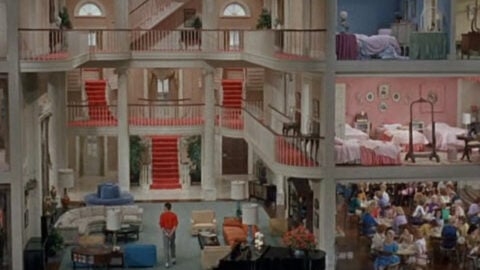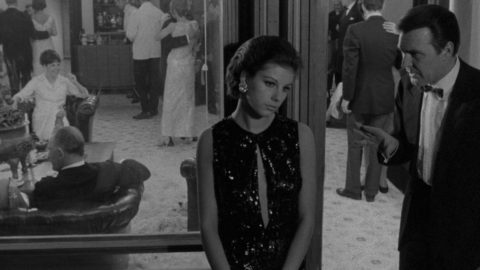Jerry Lewis + Work
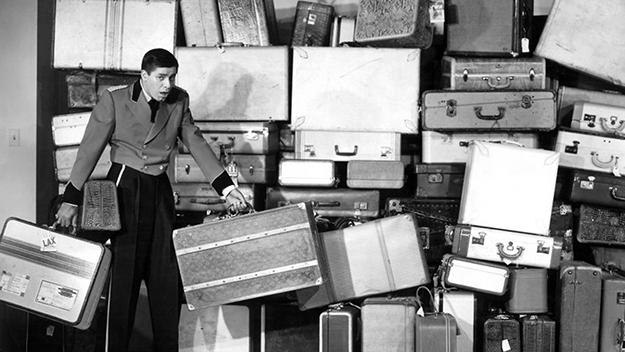
The Bellboy
On March 16, Jerry Lewis will celebrate his 90th birthday, and the Museum of Modern Art is honoring him with a mini-retrospective of his films. Four years ago I happened to attend the public celebration of his 86th birthday at the 92nd Street Y, which was hosted and moderated by Richard Belzer and featured taped messages from a cavalcade of celebrities including Werner Herzog and Donald Trump. (Trump got booed.) As was the case with the previous time I saw Lewis live in 2009, with Peter Bogdanovich as the host/moderator, it was incredibly strange. Aside from the fact that Lewis never directly answered the questions asked of him—opting to tell completely unrelated anecdotes about how great his parents or Dean Martin were, or other rambling stories from the very old days of showbiz (Charlie Chaplin, Stan Laurel)—he was openly hostile to Bogdanovich and indifferent toward Belzer (who insisted upon calling him “dad”). There were moments of Jerry shtick—that magical rise in volume and tone, a pulled face, a water jug gag—but otherwise he seemed to be exactly what he was: an old, slightly jet-lagged man wearing velour loafers. Despite the New York cold, on both occasions he looked as if he had come straight from his yacht to the event.
I paid for the experience of seeing Lewis twice, so the prospect obviously held some appeal, albeit wrapped up in frustration. But his habit of promoting himself and his collaborators did have the effect of calling forth an earlier era. And while he might exaggerate the mutual admiration in these relationships, or smooth over the rougher patches, his showbiz manner takes us all the way back to vaudeville, specifically that of the Depression era. From the age of 5 onward, Lewis frequently performed alongside his parents, both seasoned Borscht Belt veterans; as Jonathan Rosenbaum has noted, they were so devoted to their gigs that they missed his bar mitzvah. (Given his upbringing, I’ve always thought of Lewis as the kid who was obsessed with his parents records and would listen to nothing else, making him wildly unpopular with his peers.)
This relationship to older popular entertainment—in his work ethic, in his relentless flattery that never reveals what’s on the other side of the curtain—is also apparent in the types of characters Lewis would play (with the exceptions of Lewis’s approach to semi-silent physical comedy and the cameos he’d get for his films once he went solo, such as the original Keystone Kops in 1958’s Rock-A-Bye Baby). From the late Fifties through the end of the Sixties, Lewis starred in a series of pictures where his characters were poor, bumbling bachelors (usually orphaned, to really drive it home) who, by the end, would strike it rich or get together with a very pretty goil. (Or, as in The Ladies Man, surrounded by many, many goils.) Being the utterly wonderful noveau riche narcissist he is, Lewis would always portray these man-children while wearing a large gold pinky ring, giant wedding ring, and, sometimes, a gold watch, giving more than a touch of cognitive dissonance to his performances. (As I have posited elsewhere, the wedding ring might’ve diffused any guilt he experienced about his rampant infidelities at the time.)
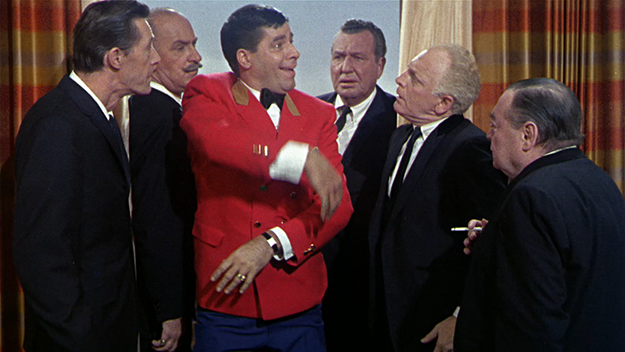
The Patsy
Despite their anarchic goofiness, this cycle of films embody some readily identifiable long-standing myths about class and class mobility in America. In The Errand Boy (61) and The Patsy (64, which effectively blends The Errand Boy with The Bellboy), delivery boys achieve fame through their clumsiness, and rise to become comedians of Lewis’s stature—even though, in fact, pratfalls and rubber faces require greater-than-average muscular control. (Myth: exceptional talent alone will get you ahead; it’s only a matter of time before you’re noticed.) In It’s Only Money (62), Lewis’s idiot private eye turns out to be the long-lost nephew of a wealthy heiress; in The Family Jewels (65), Lewis’s lovable idiot chauffeur gets to be Donna Butterworth’s daddy and inherits the millions. (Myth: you only need that one dead relative you didn’t know existed to cash in. This one is pervasive judging from the number of inheritance scams and unclaimed money services.)
However, the Lewis film that most explicitly deals with wealth is Who’s Minding the Store? (63). Written by Frank Tashlin and Harry Tugend, Lewis plays Norman, a hard-working, working-class orphan from Weehawken, New Jersey, who’s dating Barbara (Jill St. John), a heiress who’s only pretending to be an elevator operator at her family’s department store in order to find true love and avoid her domineering mother Phoebe (Agnes Moorehead). Appalled by Norman’s low-born status and simian table manners (a private detective shows her footage of him uncouthly slurping soup at a diner), Phoebe devises a scheme where he’s hired at her department store, and then arranges for him to take on a series of dangerous and awful jobs that she hopes will force him away from Barbara. (Speaking to how little things change: at one point Norman is placed in the discounted clothing department, and, along with his surroundings, gets torn to pieces by a horde of women; on the season premiere of Broad City, the same gag gets used, but at a warehouse sale.)
Yet being put through the customer service wringer doesn’t deter Norman: he sucks up the indignity because he wants to make it his own way and believes that “a man has got to be king in his own ranch-type tract house.” (The emphasis is on king: thanks to some intel from Barbara’s henpecked, CEO-in-name-only father, Norman is staunchly on the side of patriarchy, and can’t wait to save up enough cash to marry and sire lots of children.) His declaration of independence, of course, is really subservience: Norman doesn’t actually get ahead from this work. The film is so preoccupied with gags that there’s no counterpoint or subversion of its futility (cf. its utter opposite, Tashlin’s ad-busting masterpiece Will Success Spoil Rock Hunter?); what makes him finally quit the store is the discovery that Barbara’s been playing poor little rich girl the entire time. (The ending of Who’s Minding the Store? leaves things up in the air: Norman returns to walking poodles to preserve his dignity, but sees Barbara and her family struggling to manage a pack. Does this mean that they’ve relinquished their wealth, or does it only mean that Phoebe has finally accepted him? It’s a light-hearted gag that makes a cute ending but not a whole lot of sense.)
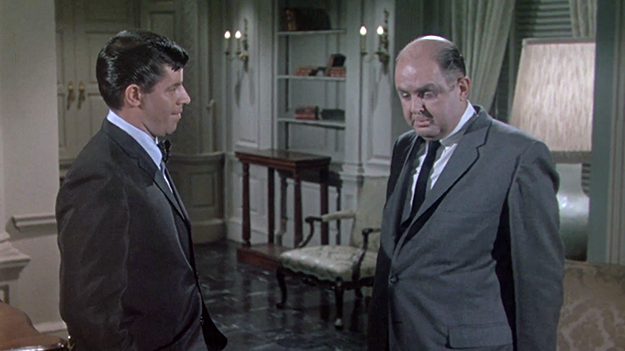
Who’s Minding the Store?
While Moorehead’s mid-atlantic accent is no longer synonymous with being rich (which is a real shame), the binaries that Who’s Minding the Store? presents and the fanciful narrative of mobility that Lewis’s films offer generally are still very deeply ingrained in film, TV, and our culture at large. The virtuous, kind, hard-working poor person gets rewarded and lifts themselves out of poverty—if they don’t, it’s because they didn’t pull hard enough on their bootstraps. If that doesn’t work, our temporarily inconvenienced millionaire will be saved by some long shot like the lottery or inheritance. And while shows like the aforementioned Broad City get a little closer to what it’s like to be working crap jobs in your twenties, they never bother to show the true consequences of having to pay a large, unexpected bill—like 63 percent of Americans. Those who dare to point out the injustices and deceptions of our current economic situation are scrutinized, excoriated, and written off as lazy. Talia Ben-Ora, aka Talia Jane, who was fired from Yelp after writing an open letter to the CEO stating how she couldn’t support herself with her full-time pay, saw her social media accounts being scoured for “proof” that she wasn’t living spartanly enough, and was labeled an entitled millenial. She also inspired a “takedown” from a 29-year-old woman (picked up by a publication called Business Insider), who told her own story of economic sacrifice as an example of what it really means to earn your keep, calling Talia out for not taking on a second job, among other things—and subsequently had her argument picked apart by a 36-year-old woman.
This string of responses speaks not only to how dire things are for twentysomethings who don’t have sufficient parental support (multiple jobs just to pay the rent, never going home for the holidays), but that there’s no attempt to think of ways to change it because “that’s just how it is.” One would be hard-pressed to find anyone who would defend Lewis’s ideas about women, Asians, or homosexuals—but why this particular nasty holdover from the past, which very clearly benefits the wealthy few, lives on isn’t so mystifying as it is sad. To approach economic inequality with the same rigor would require true pride, not the showbiz kind.



